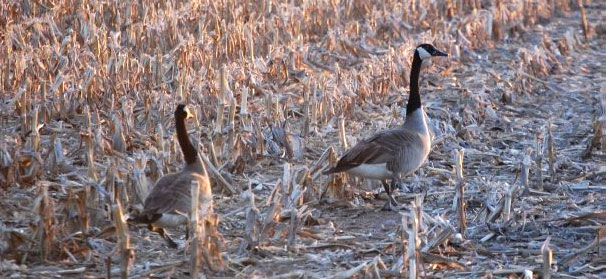

Sep 18, 2012Editorial: Beware the Canada goose
With droughts and freezes, the last thing a grower needs is damage from wildlife. Deer are usually a major problem, but a winged critter is making life difficult for some growers.
“I planted broccoli after our sweet corn was picked and something kept eating the young plants before they could really grow,” said Lillian Jacobs, owner of The Garden Spot farm in Princeville, Ill. “I figured it was deer, but couldn’t find any tracks. Then I noticed a few feathers in the field. Sure enough, it was geese.”
In fact, while visiting the farm, Jacobs and I witnessed several flocks of geese dining on her broccoli plants.
“I don’t know what I’m going to do,” she said.
Geese are a big problem for Habbleman Bros. Cranberries in Tomah, Wis., too, said owner Ray Habbleman.
“It’s not just their waste that is a problem,” he said. “They eat the young shoots off the vines and can really bring down the productivity of a block, especially the newly established ones.”
Controlling geese can be a big problem. Just ask anyone who works on a golf course. Noise deterrents such as propane cannons and firecrackers work for a short time, but are expensive and require constant vigilance, according to the Internet Center for Wildlife Damage Management.
Crop damage permits may be available in some areas, but it is important to remember that waterfowl are federally protected. Without the proper permits, harassing geese and ducks is illegal and fines are stiff.
As with many wildlife issues, hunting is a great control. In many states, an early hunting season for Canada geese begins Sept. 1. The goal is to reduce the resident populations of birds, and daily harvest limits are usually pretty liberal.
With Canada geese (notice I said Canada, not Canadian) there are several subspecies, all of which are broken down by divisions known as lessers and greaters.
Snow geese, another variety of goose species that come in huge flocks and have done severe damage to crops, as well as the arctic tundra where they rear their young, have a spring season in several states that allows for a large number of birds to be harvested.
Allowing hunters to remove some geese is a great option. By law, waterfowl hunters must use non-toxic shot, so there is no chance of lead contamination to crops. There are also laws governing proximity to roads, dwellings, etc., to keep people safe. In general, hunters are a safe, law-abiding group who just want to harvest a few tasty geese.
Geese are quite particular about where they will land. If the grass, or other cover on the ground is too long for them to get their wings above it, they will not land there. These are not small birds and prefer more open terrain for landing and foraging.
A great resource for information on species identification is the Ducks Unlimited (DU) website, www.ducks.org/hunting/waterfowl-id/canada-goose.
If you’re looking for groups of responsible hunters to help control a goose problem, the DU website lists local chapters. Another good resource is Delta Waterfowl, www.delatwaterfowl.org. Both groups list local chapters and have contact information.
I suspect, however, that if geese are visiting your farm, local hunters will soon follow. In fact, I’m betting one is knocking on your door right now to ask permission to hunt. I know, because I’m one of them.
Have you had a problem with geese or other waterfowl destroying crops? Let me know at [email protected]. I may come knocking on your door, too!
By Derrek Sigler, Assistant Editor
none














